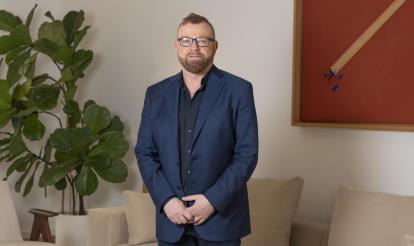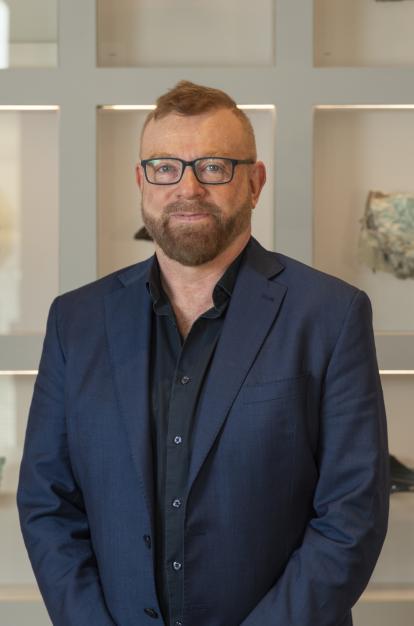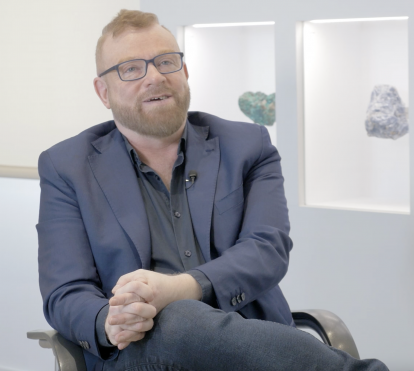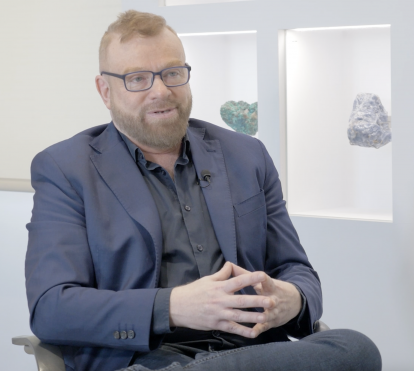
You are reading:

You are reading:

23.06.25
6 minutes readSend your questions to:
Bioquímico y doctor en
Inmunología, líder de grupo de investigación en el CaixaResearch Institute y fundador
y CEO de la empresa Galtec
In his parents’ pharmacy in Córdoba, Argentina, Gabriel Rabinovich realised as a child that his vocation was linked to people’s health and well-being. His research into the role of galectins in the immune system, which has opened up new pathways for treating cancer and autoimmune diseases, has established him as an international leader in his field. Now, the biochemist is taking on a new challenge: leading one of the research groups at the CaixaResearch Institute, Spain’s first research centre specialising in immunology.
My parents had a pharmacy in the city of Córdoba, Argentina, and I used to help them organise the medicines and I saw the patients who came in. I remember saying to my father: “I want to do something related to health to improve people’s lives.” I was also influenced by two of my secondary school teachers – one in biology and the other in chemistry – who made me fall in love with science. And when I turned 13, my sister Sandra gave me Carl Sagan’s book Cosmos. One phrase really stayed with me: “Whatever path we take, our destiny is inextricably linked to science. It is essential for our very survival that we understand science. And besides, science is a delight; evolution has made us in such a way that understanding brings us pleasure, because those who understand are more likely to survive.”

For me, doing research means discovering in order to transform knowledge, the world and society. It means creating opportunities: opportunities for students to receive training, opportunities for patients to improve their conditions, and the opportunity to introduce new, original insights to universal knowledge.
In the past, when we studied biological chemistry, we were told that sugars were merely decorative ornaments on cells, forming what’s known as the glycocalyx. For years, we believed they had no real function. Today, we know that they contain key biological information that can be deciphered by a group of proteins known as lectins, which bind to them. By attaching to these sugars in a specific way, depending on the type of sugar and its structure, they signal to the cells what to do: whether to proliferate, die or differentiate.
Our immune system normally reacts to microbes, bacteria, viruses, parasites, fungi or tumours. But there comes a point when the immune response from those billions of lymphocytes that have already been activated must return to normal; otherwise, we risk developing an autoimmune disease such as rheumatoid arthritis, multiple sclerosis, diabetes and so on. We discovered that a protein from the galectin family, galectin-1, has the ability to decode sugars in lymphocytes, immune system cells or endothelial cells, and to promote immunological and vascular programmes. When the immune response reaches its peak, galectin-1 is responsible for rebalancing the immune system.
Based on this discovery, we’ve been able to create a therapeutic platform based on galectin-1 that can eliminate the lymphocytes causing damage, for example, to the joints in the case of rheumatoid arthritis, to the brain’s myelin sheaths in multiple sclerosis, or to the pancreas in diabetes.

We also discovered something very interesting: why the lymphocytes of pregnant women do not harm the foetus (which is made up of both maternal and paternal antigens). It turns out that galectin-1 silences those maternal lymphocytes during the first trimester of pregnancy so as not to harm to the foetus.
We observed that as tumours grow they appropriate this protein and, when a lymphocyte attempts to attack them, they produce galectin-1 to eliminate it and evade the immune response. So, galectin-1 is beneficial in some cases (such as during pregnancy or to resolve an inflammatory response), but harmful in the case of cancer.
We designed a monoclonal antibody that neutralises galectin-1 and, in experimental models of various types of tumours, we successfully eliminated it to increase the immune response. It also prevents the formation of blood vessels, which means the tumour no longer receives oxygen and nutrients, thereby slowing its growth.
I’d prefer to speak in terms of treatment. In the case of immunotherapy, there’s been a tremendous revolution over recent decades. Previously, no-one thought that stimulating the immune response against a tumour could be the key to eliminating it: the focus was on chemotherapy and radiotherapy, targeting the tumour cell itself. Today, the focus is on the tumour microenvironment, and considering that galectin-1 modulates various components of this microenvironment, it suggests that blocking it could help modulate tumours, including many that are resistant to immunotherapy. This is what we’re currently observing in experimental models. One of the cancers in which it’s proving most effective is colorectal cancer, but we’ve extended the approach to a wide range of other tumours.
It’s a unique model. What makes it so distinctive is that it will be entirely dedicated to immunology, and today immunotherapy is providing solutions to many conditions that were previously addressed solely through specialist fields. Beyond infections or pathogen-host interactions, immunotherapy is offering answers in neurology (applied to Alzheimer’s disease or multiple sclerosis), cardiology (through the inhibition of inflammatory responses in cardiovascular diseases), endocrinology and, of course, cancer. It’s now understood that immunotherapy can help treat all of these conditions, because they have an inflammatory component. In fact, ageing itself brings about underlying inflammation, and if we could understand it more deeply we might be able to achieve healthier ageing.
The CaixaResearch Institute promises to be a flagship for high-quality scientific output and, just as importantly, for the translation of this knowledge into new products, delivering value to society as a whole. And having the support of the ”la Caixa” Foundation is a great guarantee.
We’ll be studying the coordinated action of what we call glyco-checkpoints, which are the interactions between lectins and glycans, to understand how they regulate immunological diseases. Our research will focus on three main areas: cancer, autoimmunity (especially neurodegenerative diseases) and infections (specifically pathogen-host interactions).

The generation of new knowledge must be linked to a whole structure which allows that knowledge to reach people, to help train human capital and to begin to reach the younger generations. In Barcelona, there’s a well-developed and interconnected ecosystem of science, technology and innovation, something that doesn’t exist everywhere. At the CaixaResearch Institute, we’ll also have a fantastic opportunity to collaborate with other institutes and do science in a truly collective way.
Precision medicine is transforming the way these diseases are treated as it allows us to identify which patients will benefit from each treatment. My hope is that in the future we won’t have to say to patients “There are no more options”. Because for those who develop resistance to a particular treatment, we’ll be able to identify the cause of that resistance and develop a new, tailored drug. The interaction between doctors and researchers will be essential. That’s why the CaixaResearch Institute and its collaboration with hospitals are so important, to foster a fluid dialogue with medical professionals.